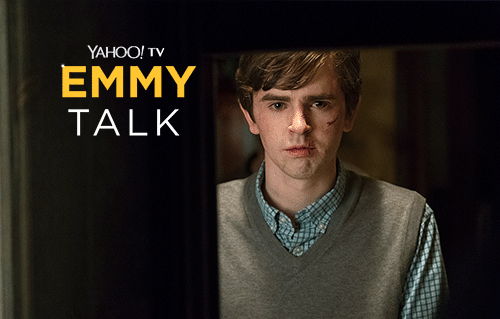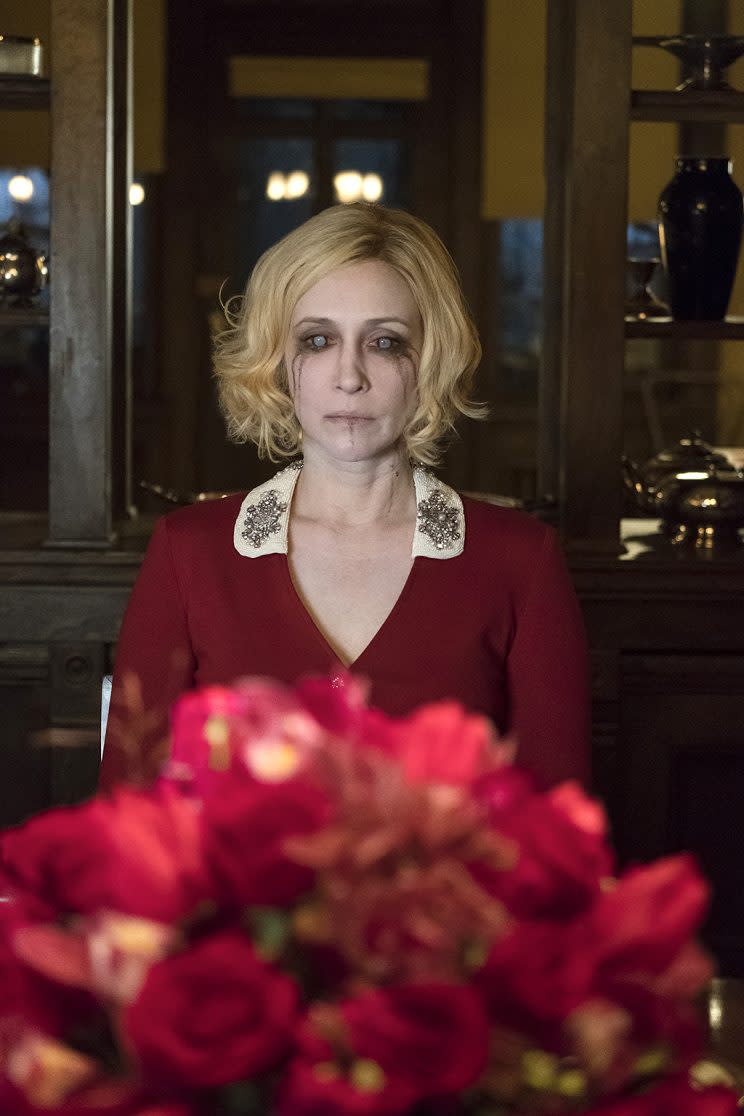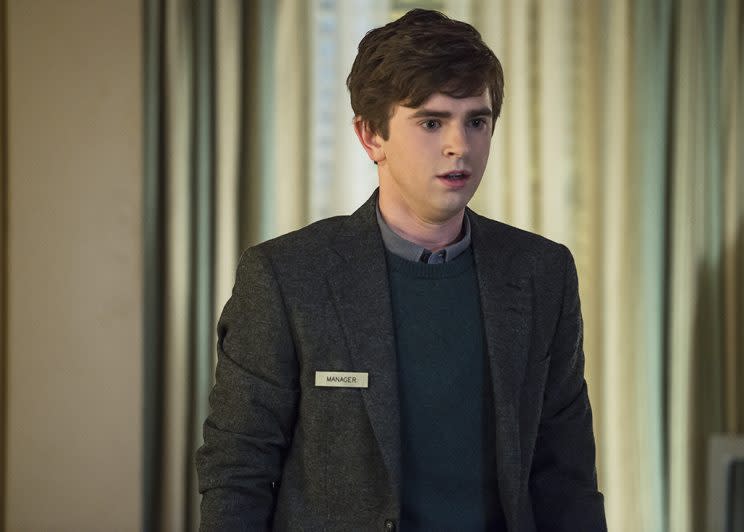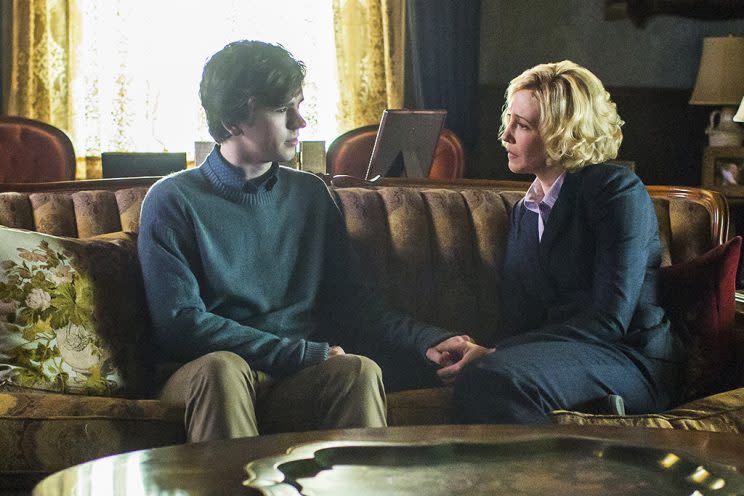Emmys: ‘Bates Motel’ EP Kerry Ehrin, Star Freddie Highmore on the Friendship That Made the Show Even Better

As we enter Emmy season — nomination voting runs June 12 to June 26 — Yahoo TV will be spotlighting performances and other contributions that we feel deserve recognition.
It took a special group of talents to tell the story of the Bates family the way it unfolded in A&E’s Bates Motel, a series that could have been nothing but grim and hopeless, but managed to be hopeful, loving, and way, way funnier than it should have been for much of its five seasons.
One of the central forces behind Bates’ wonderful tone: the professional and personal friendship between series co-creator Kerry Ehrin and star Freddie Highmore. It started, as Highmore cheekily recalled to Yahoo TV, with Ehrin being late for their first Skype meeting, but quickly evolved into a shared bond over their similar senses of humor and attitude about the more trivial aspects of working in the entertainment industry. And it not only became stronger as the Bates cast and crew continued to wind the show down to the exact ending they had always envisioned, but it’s carrying on as Ehrin and Highmore continue to develop other television projects together.
The two — both deserving of Emmy nods for the show’s final season — talked to Yahoo TV about what tickled them about Norman, the quirkiness that makes them laugh, and how both of those things helped them tell the Bates story.
They also share when they knew they wanted to continue to work together, and what personal mementos they kept to remind them of their time at Bates Motel.
Kerry, just getting on a phone call with you makes me think we’re going to talk about a new season of Bates Motel.
Kerry Ehrin: That’s so funny. I’m experiencing the weirdest thing, which is my body and brain are reacting as if we’re going into production in the fall. I keep waking up feeling, “Oh, I have to get the scripts right.” You know when they say you lose a limb, but you still have feelings from it, that it’s still there? That’s what it feels like.
I’m sure fans would take another season.
Ehrin: You know, collecting everybody back together would be… honestly that’s the saddest thing about a show breaking up, it’s just how fast everyone scatters to the four winds. It’s like everybody is on a freaking show. I’m still sort of getting used to the idea that the show’s over.
Freddie’s on the call now.
Ehrin: Freddie’s elevator has arrived.
Every time I’ve talked to either of you separately or together, there’s always been a special connection between the two of you. You both have said it exists, but you didn’t even have to, it was clear.
Freddie Highmore: Wonderful. Let’s see if we have anything to say about each other.
When was the first time you met? Was it for Bates, or had you met previously?
Highmore: Kerry, you were late.
Ehrin: We had a Skype meeting. It was Freddie, Carlton [Cuse, the show’s other co-creator], and me. I was 20 minutes late. I got caught in traffic, it wasn’t my fault. [Laughs] I don’t know why, but yeah, I just got in on the end of the call, and we talked to Freddie for 10 minutes and just thought he was charming and wonderful, and very adult compared to the last things we’d seen him in. I mean, the first time I met you though in person was in Vancouver. Freddie and I — and I think this is safe to say Freddie, and correct me if I’m wrong — I think at the time we were pretty reserved. We’re people who emerge, I think, a little slowly and cautiously. I just thought he was funny right away. We started up a texting relationship pretty quickly. There was just a chemistry that emerged between the two of us that was incredibly amusing.
Highmore: I would agree. I think the two of us have a similar attitude towards the business in general, and the silliness of it all. We both see through it, see through the fa?ade, as opposed to believing it. It was nice to embark on this project at the beginning with someone who also was, first of all, aware of how fortunate we were to be doing it and to be there, but also just how crazy it was as we bring back to life this world from Psycho and try to reimagine this story.

I would have guessed you had similar senses of humor, or appreciated the same humor, just from what we saw in the show. Did that connection and that recognition of the shared attitude about the business help you both really delve into the story and the characters more — give you the freedom and trust to go forward with some big ideas like we saw in Bates Motel?
Ehrin: I think that’s absolutely true, yes. If you feel like someone has basically the same sort of moral sensibility as you or that they view the world in the same way, that they have similar personal character priorities, trust is established in that sense. You throw in that you have a very similar idiosyncratic and absurd sense of humor, that certainly helps. I would say the third thing is that I am a person who lives inside of a fictional world when I’m doing a show. I live inside of it 24/7. I’m always thinking about it, I’m always pushing at it in my brain. I enjoy inhabiting the world, I would say it that way. I think of all the people on Bates, Freddie was always in that imaginary space 24/7, too. We could always find each other in there, because when other people had gone to bed, we were both up. It’s like we were up in the imaginary space, and that was also incredibly bonding.
Highmore: It was a nice bridge between the two worlds, too. Obviously, Kerry, most of the time, was in L.A. writing in the writers’ room or editing and working on different cuts, doing everything that a showrunner has to do from L.A. I was in Vancouver. It felt like those two worlds were bridged by, as Kerry said, that shared bond of being inside the Bates world 24/7. I think we were so committed to it and had such a love for the show — especially at times, like Seasons 4 and 5, we became more insanely committed to it. It was just a wonderful, wonderful thing to be able to ring up at any time of day and ask Kerry for her thoughts on this particular scene or this particular moment. I’d say in terms of the commitment level, we both had a shared desire for nuance and for making sure that every single moment was as good as it could be. It would be funny, the things that I would raise to Kerry or that she would raise to me in terms of performance or in terms of a line here or there. They would usually be tiny, small, seemingly insignificant things that anyone else would be like, “I don’t even understand what’s the difference between what you’re saying,” whereas the two of us… I guess it comes from a place of perfectionism in a way, of wanting everything to be as good as it could be and not have any moment that feels false or wasn’t quite right.
In terms of the humor, too, I would say that a lot of our humor you can see in Norman. I feel like he’s a character who makes us laugh maybe more than anyone else. We would watch the scenes back or read them through and they were just so funny. No one else would get it. They’d be like, “Well, this isn’t a funny scene, the guy’s murdering something.” We both understood Norman and his idiosyncrasies and appreciated them. Sometimes you have those little secrets that — what was it, Kerry, that you’d said in terms of the writing, the piece of advice you gave?
Ehrin: Yeah, there are certain things you put in a script that mean a lot to you, but you’re going to die with that secret, because it’s not apparent to everyone. The thing is, I miss Norman so f**king much. He’s so dear to me and so funny. Nothing delighted me more than Norman being pissy and feeling like he really put someone in their place. He did it, actually, in a lame manner, but he would be very pleased with himself. That kind of idiosyncratic, precise humor is something that Freddie and I just share and delight in.
Is there anything from the final season that’s an example of that? I’m immediately thinking of the scene at the hotel desk…
Ehrin: David Davidson?
Yes! When Austin Nichols’ Sam Loomis, a.k.a. David Davidson, checked in, the way Norman is just so superior to him, judging him.
Highmore: I think also when Norman lies badly, that would amuse us loads, too. It’s [about] living in this delusion, but we all do it, too, of thinking, “Oh, that went really well.” Norman thought it had gone really well if he’d outman someone, like in some fight with David Davidson, and put him in his place, or whether it’s when he’s with Sheriff Greene. When Sheriff Greene would be quizzing him, and Norman would think that he’s talked himself out of something, but he looks like the most obviously nervous and culpable person around. Those things made us laugh, too.
Ehrin: I was just going to say, I think those moments are funny, and they’re also so incredibly endearing. He’s so innocent. He’s like this little lamb in the world, and he just can’t handle it.
Those moments always made you love him even more, and made you wish even more that this story was going to end differently than you knew it was going to have to end. You two are working on some other projects together, including Long Distance, a drama at NBC about long-distance romance. At what point did you realize, “Hey, we want to continue working together”?
Highmore: I think, when Kerry was gracious enough to let me into the writers’ room on Bates, in Season 4. From that point, it seemed that we could. There was a collaboration that existed beyond purely the sense of writer and actor relationship that we had until that point on Bates. It was always a collaboration; Kerry was never a showrunner who would lock herself away in her office and never reveal her emotions and come out and only occasionally make an appearance and then go back home. Everyone on the set felt a real connection to her and felt that they were working with her even if she was often in L.A. I think for me, when we started to do that in Season 4 in the writing, it became clear that we could build on that shared sensibility that we started on Bates and put it to other uses. At the end of Bates, it was that sense of, we have to find something else.
Ehrin: In any kind of special relationship — whether it be a love relationship, a friendship, a parent-child relationship — when two people really connect, there’s an extra dimension that they create together. There’s a world that exists when Freddie and I are together that does not exist otherwise. That’s hard to give up. That’s a really fun world to be in. Yeah, it’s very rare and not only creatively, but personally, I mean, somebody who has such good character… Freddie has never disappointed me, ever. That is such a rare thing in Hollywood, to have a long-term relationship with someone where you’re just totally solid and you trust each other.
Those of you who made this show took this property that was so well known, this iconic character, and you created all these new stories and layers to them. You paid homage to the original, you expanded on the original, you twisted the original in wonderful ways. You did all of that in the timeframe that you wanted, and you ended it in the way you wanted. Do you think all of that would have been possible if you hadn’t all had a connected, collaborative relationship? Nestor Carbonell and Max Thieriot also directed, in addition to acting in the show. You all always speak about the show in a way that made it clear you’re connected, and committed to your characters and the story.
Highmore: Yes, I completely agree. I don’t think it would have been the same at all, and the outcome wouldn’t have been anywhere near as good. I mean, we spoke earlier about how much Kerry and I care about the show and put everything into it. I think the same goes for everyone who was on the show. There’s the two sides of looking at, for example, actors who went on to direct. There’s this very generous side that it shows from the showrunners, from Kerry and Carlton, who gave us the opportunity to do those things. It’s also equally as rare, I guess, to have a cast that really wanted to do those things and wanted to be a part of it all. I wanted to go and spend weeks and months in the writers’ room, and Nestor wanted to direct three times, and Max really wanted to direct. Everyone wanted to commit to [the show] as much as they possibly could and help out as much as they could in order to make it something special. No one came in and said their lines and left. Beyond just the actors and the writers, the crew that we had were phenomenal and cared so much about it, too, and were sad to see it go. They would turn down things, jobs in-between [seasons], to come back and be on Bates year after year in Vancouver.

Ehrin: And Vera [Farmiga], who just gave so much to the show over the years. This is just so emblematic: in the last season, when Norma is dead, and we had made a dummy to use for certain scenes, Vera wanted to do it herself. She didn’t like the dummies. I just loved that about Vera. She wanted to get in there and be dead Norma, because she knew that was her, that was her character. I feel like that beautiful commitment that everybody had to the world we were building was really a magical thing.
Having been away from the production for a while now, are you missing telling this story, wishing that there was more to tell?
Ehrin: I miss everything about it. I miss Carlton, I miss production, I miss everything. I miss the fictional world, although I feel like I carry that around inside of me a little bit more. I miss the people very much. I’m so happy everybody is doing stuff already, but it’s also a little bit hard for me to see, honestly… I feel like a mom [and] all the kids left. You know they’re all going to leave, but they all left. It’s life. You deal with it, but yes, I miss it very much.

Did either of you keep anything from the production, something that had some special meaning to you or something that was just really personal?
Highmore: I got Norman’s Bates Motel manager’s badge, which I think is another source of humor for both me and Kerry.
Ehrin: Norman being so excited to be made manager by Norma. He has his pride in it. Yeah, I have two things, the chair that dead Norma sits in in the freezer, which is pretty awesome.
Highmore: That is awesome. Where is it?
Ehrin: It’s in my living room. And this is a really weird one, but I have this green tray from the [Bates mansion] living room, because every time I was on the set, we were doing some really intense scene in the living room. I love scenes in the living room, and for some reason, those scenes are always fabulous. Anyway, I took the green tray, because it was part of my own home to me. I felt I had experienced so much around that green tray.
Is it in your home now, too?
Ehrin: Yeah, it’s in my dining room. It’s one of the first things I see when I walk in the house every day. It just brings me straight to Bates when I see it.

(Credit: A&E)
You talked about texting and calling each other all the time during the show. What’s the longest phone call you ever had during Bates?
Highmore: Must have been at least an hour or more.
Ehrin: Yeah, probably more. Our friendship, I believe, is a story told in text. I think because Freddie was in Vancouver, I’m in L.A. But we just communicated daily, like multiple times a day. About all kinds of things. I can’t even think of it as like, one was a really long one — it was just ongoing. It started somewhere around week three of filming, and it just didn’t stop.
Highmore: Also, as you’re probably aware, I guess I get excited about something, or it’d be like pitching an idea to Kerry or talking about a small change, and I would spend a good five minutes probably repeating myself again and again as to why this was such a great thing to do and such a great change to make, and then I’d finish, and Kerry would be like, “Yeah, yeah, okay. That’s fine.” Like, “Great, what’s next?” [Ehrin and Highmore both laugh.] I remember in the meeting for the episode I directed [Season 5’s “The Body”], there was this huge, long, drawn-out pitch for the beginning that was about 10 minutes long, and then it was like, “Well, I guess we can’t really say no to that… Let’s just get on to the second paragraph in the script, and let’s just keep things moving.” Thank you for indulging me, Kerry, at all moments.
Ehrin: It was always a pleasure. It was always fun.
Read more from Yahoo TV:
Emmys: ‘Westworld’ Star Thandie Newton on Embodying the ‘Daring and Vicious’ Maeve
Emmys: ‘This Is Us’ Star Milo Ventimiglia Gets Misty Revisiting ‘The Pool’
Emmys: ‘Stranger Things’ Star David Harbour Revisits Sheriff Hopper’s Tough-Guy Moment
Emmys: ‘Feud’ Star Susan Sarandon on ‘The First Time I Really Felt Like Bette’
Emmys: ‘Legion’ Star Aubrey Plaza on ‘Trying to Act Like Beyoncé’ in Dance Scene
Emmys: Alexander Skarsg?rd Revisits His ‘Big Little Lies’ Therapy Session
Emmys: ‘OITNB’ Star Laverne Cox Revisits Sophia’s Brave Pushback Against Solitary Confinement
Emmys: ‘Better Things’ Creator/Star Pamela Adlon on Being the Boss
Emmys: ‘Gilmore Girls’ Star Lauren Graham Revisits Her ‘Scariest’ Scene
Emmys: ‘This Is Us’ Star Mandy Moore on Prosthetics, Those Infamous Texts From Her Parents

